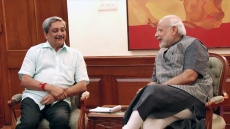In a setback to Punjab, the Supreme Court on Thursday struck down as unconstitutional its 2004 law intended to deny Haryana its share of Sutlej-Yamuna water, saying the 1981 agreement was legally binding and Punjab could not act unilaterally to nullify an apex court decree's effect.
Holding the Punjab Termination of Agreement Act, 2004, not in conformity with constitutional provisions, the constitution bench of Justice Anil R. Dave, Justice Pinaki Chandra Ghose, Justice Shiva Kirti Singh, Justice Adarsh Kumar Goel and Justice Amitava Roy answered in the negative all the four questions referred to the apex court in a Presidential reference.
"The Punjab act cannot be said to be in accordance with the provisions of the Constitution of India and by virtue of the said act, the state of Punjab cannot nullify the (apex court's 2002 and 2004) judgment and decree and terminate the agreement dated 31st December, 1981."
"We are of the view that the Punjab act cannot be considered to be legal and valid and the state of Punjab can not absolve itself from its duties/liabilities arising out of the agreement in question," held Justice Dave, speaking for the bench.

The verdict also said that Punjab cannot discharge itself from an obligation arising from the court's January 15, 2002 and January 4, 2004 judgments and decree.
In a separate opinion, Justice Singh said: "...delay in execution of a final judgment or decree, more so when it is of the apex court, should never be countenanced by any authority because it would surely tend to undermine people's faith in the judicial system..." and would mean "avoidable harm to all the institutions and functionaries under the Constitution, may be even to the Constitution itself".
The court said that the existing agreement has "thus a legal sanction" and once a court has passed a binding decree, any party to the litigation cannot unilaterally act in a manner to nullify the decree's effect.
Holding that the Punjab law clearly violated the 1981 agreement, the court said the state had "exceeded its legislative power in proceeding to nullify the decree of this Court and therefore, the Punjab Act cannot be said to be a validly enacted legislation .."
The court said that the agreement, about sharing Ravi and Beas rivers water, could not have been unilaterally terminated by any of the parties through its legislative power and if done, "such unilateral action of a particular state has to be declared contrary to the Constitution of India as well as the provisions of the Inter State Water Disputes Act, 1956".

It also rejected Punjab's contention that July 22, 2004 Presidential reference was not maintainable and should be returned unanswered, ruling this was "not a case where this court would like to refuse to give its opinion to the President under the provisions of Article 143 of the Constitution ... as there is no good reason for the same".
The reference had sought the court's advisory opinion on four questions including whether the Punjab law was were in accordance with provisions of the Constitution, Section 14 of the Inter-State Water Disputes Act, 1956, Section 78 of the Punjab Reorganisation Act, 1966 and its March 24, 1976, notification.
Besides this, it had also sought the top court's advisory opinion on whether Punjab had validly terminated the 1981 agreement and all others relating to the Ravi-Beas waters and was discharged from its obligation under them, and also the top court's judgments, orders and decrees of January 15, 2002 and June 4, 2004.
As Punjab was not implementing the 1981 agreement with it and Rajasthan on sharing Ravi and Beas' waters, Haryana moved the apex court, which on January 15, 2002 held it was the central government's duty to see the agreement was complied with fully.
It also asked Punjab to complete the construction of the Sutlej-Yamuna Link canal within its territory in one year, failing which the central government would take over the work, and this was ordered in its 2004 judgment.

Subsequently, the then Congress government headed by Amarinder Singh got passed the act terminating all water-sharing agreements with Haryana, Rajasthan, Himachal Pradesh, Jammu and Kashmir, Chandigarh and Delhi.





